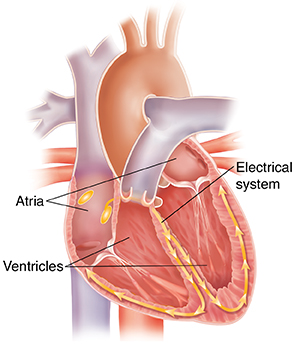Understanding Bradycardia
Your heart has an electrical system that sends signals to control the heartbeat. Any abnormal change in the speed or pattern of the heartbeat is called an arrhythmia. An arrhythmia that causes the heart to beat slower than normal is called bradycardia. There are many types of bradycardia. In healthy children and adults, bradycardia is often normal, particularly during sleep. Sometimes bradycardia is caused by failure of the heart’s natural timer or failure of the electrical pathways within the heart. Depending on the type you have and how severe it is, you may need treatment.

What causes bradycardia?
Many things can cause bradycardia, including:
-
The natural aging process
-
Coronary artery disease
-
Heart attacks
-
Heart muscle disease
-
Problems with the SA (sinoatrial) node. This is the heart’s natural pacemaker that starts each heartbeat.
-
Problems with the electrical pathways in the heart
-
Problems with the structure of the heart that you are born with
-
Infection
-
Use of certain medicines
-
Electrolyte imbalances
-
Underactive thyroid
-
Sleep apnea
-
Increased pressure in the brain or stroke
Well-conditioned athletes often have a naturally slow heart rate.
What are the symptoms of bradycardia?
Bradycardia can cause an irregular heartbeat. It can also make it harder for the heart to pump blood to the body. This may cause symptoms such as:
Some people with bradycardia have no symptoms at all.
How is bradycardia treated?
Treatment for bradycardia depends on the cause. It also depends on the type you have and how severe your symptoms are. If you need treatment, your options may include:
-
Treatment of the underlying cause, if the cause can be fixed. For instance, if a medicine is causing bradycardia, stopping the medicine, under your healthcare provider’s guidance, may correct the problem. Or if a condition such as an underactive thyroid is the cause, treating the thyroid may keep bradycardia from coming back.
-
Medicines. Medicines may be used to treat conditions that cause bradycardia. Some medicines can also be used in the short-term to increase the heart rate. These are generally given through an IV (intravenous) line and therefore are not long-term solutions.
-
Pacemaker. This is a device that is placed permanently under the skin (usually in your chest) and connected to your heart. The device monitors your heart, and when the heart beats too slowly, the device sends electrical impulses to keep the heart beating at the right pace.
-
Temporary pacemaker. A temporary pacemaker may be connected to the heart using wires guided through a blood vessel in your neck or leg to the heart. This is also sometimes done using special pads placed on the chest. This may be used in an emergency, as a bridge to permanent pacing, when pacing is only needed short-term, or to further evaluate your condition.
What are possible complications of bradycardia?
These can include:
-
Development of other types of arrhythmias
-
Falls or fainting and injuries that happen as a result
-
Heart failure. This problem occurs when the heart weakens so much that it no longer pumps blood well.
-
Sudden cardiac arrest. This is when the heart suddenly stops beating.
When should I call my healthcare provider?
Call your healthcare provider right away if you have any of these:
Online Medical Reviewer:
Anne Clayton APRN
Online Medical Reviewer:
Stacey Wojcik MBA BSN RN
Online Medical Reviewer:
Steven Kang MD
Date Last Reviewed:
1/1/2022
© 2000-2024 The StayWell Company, LLC. All rights reserved. This information is not intended as a substitute for professional medical care. Always follow your healthcare professional's instructions.